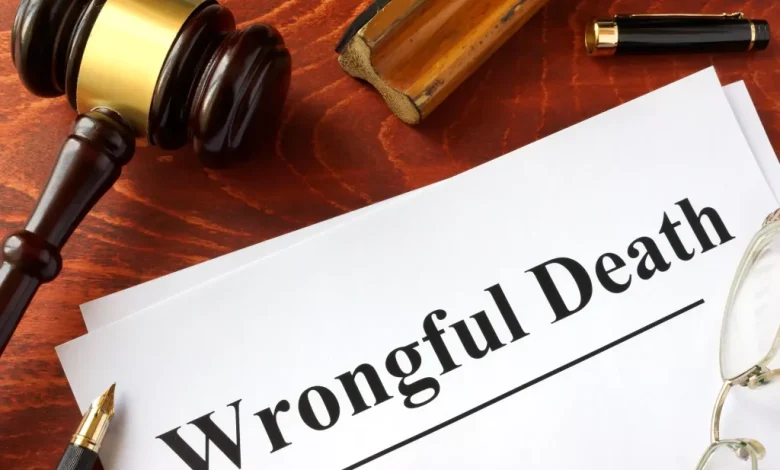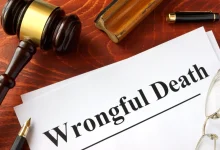Pursuing Claims Against At-Fault Parties in Kansas City Wrongful Death Cases

In Kansas City, pursuing a wrongful death claim involves navigating complex legal terrain, especially when identifying and holding at-fault parties accountable. These cases arise when a death is caused by the negligence or wrongful act of another, often involving intricate details and requiring the expertise of legal professionals. For families dealing with such a loss, understanding how to proceed legally is crucial.
For those seeking justice in these grievous circumstances, securing representation from a Kansas City wrongful death lawyer can be a vital step. Such legal experts are equipped to handle the nuances of wrongful death claims, ensuring that the victim’s family receives compensation for their loss while holding the responsible parties accountable. This article will explore the key aspects of pursuing claims against at-fault parties in wrongful death cases in Kansas City.
Understanding Wrongful Death Claims
A wrongful death claim in Kansas City allows the deceased’s family or estate to seek damages from the person or entity responsible for their loved one’s death. This legal action is typically pursued when the death results from negligence, such as in car accidents, medical malpractice, or workplace incidents. Establishing negligence is the cornerstone of these claims, requiring clear evidence that the defendant’s actions directly led to the death.
The legal framework in Missouri mandates specific criteria for who can file a wrongful death claim, typically immediate family members or a representative of the estate. Understanding these nuances is crucial, as it ensures that the right parties are taking action and that the claim is filed within the statute of limitations, generally three years from the date of death.
Establishing Fault in Wrongful Death Cases
Determining fault in a wrongful death case involves proving that the defendant’s negligence or intentional actions caused the death. This often requires an extensive investigation and the collection of evidence such as eyewitness testimonies, camera footage, and expert opinions. Legal teams play a critical role in assembling this evidence and establishing a strong case against the defendant.
Moreover, wrongful death cases often involve multiple parties which can complicate determining liability. For instance, in accidents involving commercial vehicles, liability may extend beyond the driver to include the employer, vehicle manufacturer, or even government entities responsible for road maintenance. Lawyers specializing in wrongful death must navigate these complexities to effectively advocate for their clients.
Calculating Damages
In wrongful death cases, calculating damages involves several factors, including the economic losses related to the deceased, such as lost wages and benefits, as well as medical and funeral expenses. Non-economic damages, such as pain and suffering, loss of companionship, and emotional distress, are also considered. These calculations require thorough documentation and often the expertise of financial analysts or forensic accountants.
Kansas City law allows for the pursuit of punitive damages in cases where the defendant’s actions were particularly willful or egregious. These damages are intended to punish the at-fault party and deter similar conduct in the future. The calculation of these damages is typically complex and requires a clear demonstration of malice or extreme negligence.
Negotiating with Insurance Companies
Dealing with insurance companies is an inevitable part of pursuing a wrongful death claim. These companies often aim to minimize their payouts and can present significant challenges during negotiations. It is essential for the legal representatives of the deceased’s family to be skilled in these negotiations to ensure fair compensation is offered and accepted.
Often, wrongful death claims are settled out of court to avoid the uncertainties of a trial. However, if a satisfactory settlement cannot be achieved, it may be necessary to proceed to court. Legal experts must prepare thoroughly for this possibility by building a strong case and being ready to argue effectively in front of a judge or jury.
The Role of Expert Witnesses
Expert witnesses play a pivotal role in wrongful death cases by providing specialized knowledge that helps to clarify the circumstances of the death. Medical experts, for instance, can testify about the cause of death and link it directly to the defendant’s actions. Accident reconstruction experts can offer insights into how an accident occurred and who was at fault based on the evidence at the scene.
The testimony of these experts often carries significant weight in negotiations and trials. It is crucial for legal teams to select and prepare their expert witnesses carefully to ensure their testimonies are clear, credible, and pertinent to the case.
Navigating Trial Procedures
Handling the trial procedures in a wrongful death case is a meticulous and strategic process. Here’s a breakdown of the essential steps involved:
- Filing Legal Documents: Ensuring that all necessary legal documents are correctly filed with the court. This includes the initial complaint, pre-trial motions, and other required paperwork throughout the course of the trial.
- Adhering to Deadlines: Strictly following all court deadlines for submissions and responses. Missing a deadline can jeopardize the case, affecting its progression and potential outcomes.
- Jury Selection: Participating in the selection of the jury that will hear the case. This process involves screening potential jurors and deciding which individuals may be biased or unable to judge the case fairly.
- Presenting the Case: Skillfully presenting the case in court, which includes opening statements, direct and cross-examination of witnesses, introducing evidence, and making legal arguments.
- Examining Witnesses: Preparing and examining witnesses, including expert testimonies that support the case. The ability to question witnesses effectively is crucial for clarifying the facts and reinforcing the legal arguments.
- Countering Defense Arguments: Responding to and countering the defense’s arguments, challenging their evidence, and discrediting unreliable testimonies to strengthen the plaintiff’s position.
- Final Argument: Delivering a compelling closing argument that summarizes the evidence and reiterates why the jury should decide in favor of the plaintiff.
Securing a Settlement or Verdict
The ultimate goal of a wrongful death lawsuit is to secure a settlement or verdict that provides adequate compensation for the family’s losses. This involves not only winning the case but also ensuring that the awarded amount reflects the true extent of their loss and suffering. Post-trial negotiations may also be necessary to finalize the terms of the settlement.
In some cases, securing payment from the defendant can be challenging, especially if insurance coverage is insufficient or the defendant lacks the financial resources. Legal teams must be prepared to pursue various avenues to collect the awarded amounts, such as garnishing wages or placing liens on property, to ensure that the family receives the compensation they deserve.


